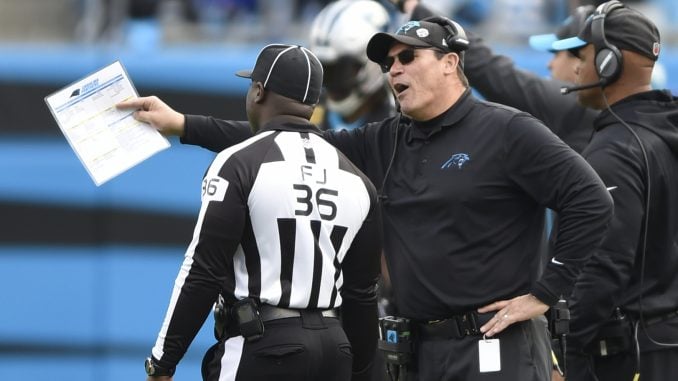
In the three years since Ron Rivera led the Carolina Panthers to the Super Bowl, the team has hit some rough patches, struggling to a 24-24 record and one playoff appearance.
A 7-9 record this year, his second losing season in the three years since Riverboat Ron won the NFC title and NFL Coach of the Year honors, had fans and media speculating that he might be on the chopping block.
It now appears that Rivera will return for another year with the Panthers. Is the front office’s patience merited? To try to get an answer to that question, we looked at the other coaches to lose their first trip to the Super Bowl and see how they did as an encore.
As might be expected from a coach with a .500 mark, Rivera’s .500 mark is smack-dab in the middle. Of the 27 Super Bowl losing coaches, Rivera’s 24 wins over the next four seasons are tied for 14th best.
Combined, the coaches went 632-504-8 over their three post-Super Bowl seasons, a .556 winning percentage.
That percentage is very close to the Super Bowl losing coaches’ performance for the rest of their coaching careers. After losing their Super Bowl debut, the 27 coaches went on to go 1,983-1,586-25 in the NFL, a .555 percentage.
Rivera is decidedly behind schedule when compared to some of the bigger names on the list. Tom Landry lost in Super Bowl V, then bounced back to win the title the following season. He added a second Super Bowl title six years later.
After losing to the Jets in one of sports’ biggest upsets in Super Bowl III, Don Shula returned to the Super Bowl in his third season. After losing that one, he won the next two.
Dan Reeves returned to the Super Bowl the following season, after his Broncos lost Super Bowl XXI, and made it back two of the next three years, although he never brought home a title.
Washington’s George Allen went to the playoffs three times in his next four seasons after losing Super Bowl VII. Andy Reid returned to the postseason four times in his next six years.
Marv Levy, of course, made history by returning to the Super Bowl the next three years, becoming the first coach to lose four in a row.
So, it’s safe to say that Rivera isn’t on pace to become a legendary or Hall of Fame coach. Still, he’s doing better than some coaches. Oakland’s Bill Callahan was fired after going 4-12 the year following his Super Bowl XXVII loss to Jon Gruden and the Bucs. New York’s Jim Fassel (Super Bowl XXXV), Denver’s Red Miller (Super Bowl XII), Oakland’s John Rauch (Super Bowl II) and the Rams’ Ray Malavasi (Super Bowl XIV) were all fired after year three. Three of the four had sub-.500 marks — Fassel at 21-27, Malavasi at 19-22 and Rauch 19-22-1 despite returning to the AFC title game the following year. Miller was dismissed after a 28-20 three-year mark.
Then there were the coaches who, like Rivera, had the patience of management. Hank Stram went 19-19 after losing Super Bowl I, then won the Super Bowl in year four.
On the flip side, Forest Gregg went 22-19 after his Bengals lost Super Bowl XVI. He returned the team to the playoffs the next year and then never again over six years of coaching. Raymond Berry, whose Patriots lost Super Bowl XX to Rivera and the Bears, also had one more playoff berth the rest of his career, as did Sam Wyche.
Of course, it’s easy to decide whether or not to keep a coach in hindsight. Looking at the coaches whose record following the Super Bowl were most similar to Rivera’s, we see that it’s a mixed bag.
Reid was the only other coach to match Rivera’s 24-24 mark over the next three years with one playoff appearance. The Eagles went on to make the NFC title game in year four, starting a three-year playoff run. He’s also gone on to become one of the sport’s top coaches with a successful stint in Kansas City that includes hosting the AFC championship game on Sunday.
Ken Whisenhunt went 23-25 with one berth following Arizona’s loss to the Steelers in Super Bowl XLIII. He went 5-11 in year four, getting fired. In two years after getting another chance in Tennessee, he went 2-14 and 1-6 before getting fired.
Lovie Smith went 23-25, then produced an 11-5 record and a trip to the NFC title game in year four.
So, while the history isn’t overly promising, it appears that a fourth year for Rivera is probably merited. He’s not a superstar coach, nor is he a flameout who reached the game on a fluke. This upcoming season should give a better indication of which trajectory he’ll follow.



